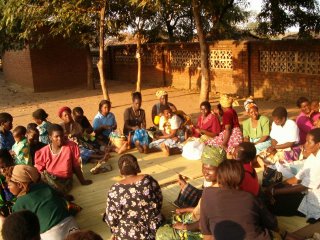Part Two: August 2-3
On Tuesday I met Paul Msoma who has set up the catchily titled Institute for Policy Research and Social Empowerment. Trócaire are funding the Institute’s research into the implementation of Malawi’s HIV and Aids strategy. Paul’s aim is to turn the Institute into the premier think tank for public policy issues in Malawi providing alternatives to the models of development imposed by donors and the international financial institutions. He’s also chair of the Southern Africa Social Forum that will bring approximately 7000 people from the 14 countries in the region to Lilongwe to discuss trade, agriculture, health and HIV and Aids later in the year. But despite all this commendable work, what I will most fondly remember Paul for is sorting me out with a loan of a Malawian mobile phone for my 10 days here; the man is a legend for this alone.
On Wednesday, I finally got out of the NGO offices and into Lilongwe’s townships with Sister Mary Doonan from the Medical Missionaries of Mary (MMM’s) and I get to meet some Malawians who don’t work for NGOs. Sister Mary drove me out to the townships of Mtsiriza and Nthandire to see the extra English classes and women’s craft groups the MMM’s are providing there. As Sister Mary talks about the problems people face in the townships, the list is overwhelming; the lack of water supply, HIV and Aids and all its opportunistic infections, Malaria, Tuberculosis, the burden of orphans, widespread violence and sexual abuse of women and children. The nearest hospital to the township is about 10km away, but like many hospitals in Malawi it doesn’t have drugs. Sister Mary has set up a small fund to provide people with drugs. Salome Myirenda, a local women who is helping Sister Mary provide the craft workshops, describes the negative attitude to orphans in the townships. Families that are having difficulty providing for them selves cannot take on the burden of more children. “You have people unemployed with nine, ten, eleven kids and there are less and less grandparents around to support in child rearing”. Malawi’s life expectancy has dropped to 37 and the dependency ratio is huge. Unemployment is over 70 percent. As we leave the townships, we see three tired looking women sitting down outside one of the houses. Sister Mary says they are the home-based care workers in this area who help the sick and the elderly. I find it impossible to describe the effect of seeing all this for the first time, without descending into cliché and sentiment, but there is a sense of privilege in witnessing the spirit and warmth that people like Salome and Sister Mary bring to their work in this environment. There is also of course an awkward sense of embarrassment at the grotesque gap between the opportunities I have had in life compared with the children and women I have seen today.
I am plunged back into the world of NGO discourse, at Trócaire’s Malawi Civil Society Workshop at the Cresta Crossroads hotel in Lilongwe on Thursday. Trócaire are planning their civil society programme for the next three years and this two-day workshop is an opportunity to get our partners input in designing the programme. NGO’s working on health, education and agricultural and broader economic and social issues are present. I’m taking the notes on the discussions for the day and it gives me a chance to meet people from all our civil society partners here and gives great insight into the extent of the issues they are working on and the problems they face.



<< Home